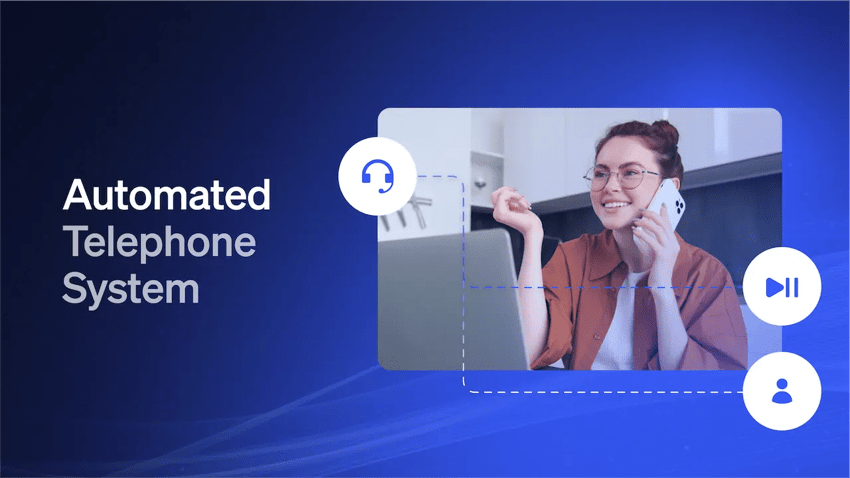There’s nothing worse than nearly landing a new customer but having it fall through at the last minute because of missed communication. In 2025, more than 5 billion people use text messages every day. The best business text messaging apps can ensure your company never misses another opportunity.
Texting from your business line is a must these days, as it provides many ways to stay in touch with customers, qualified leads, and even employee group texts. A business text messaging platform offers features like mass texting, scheduling, and industry-specific templates, making it an essential tool for managing bulk messaging and automating customer interactions.
Here, we help you choose the best texting service for your business so you never miss another lead and your team is always in sync.
The Best Text Messaging Services For Business
Here’s a quick overview of the best text messaging services for SMS automation and bulk SMS marketing campaigns.
| Messaging app | Best for | Standout features | Pricing | Integrations |
| Nextiva | All businesses, particularly those in highly regulated industries like healthcare and finance | SMS reply suggestions based on customer personality insights | Starts at $15/month | 20+ native integrations with CRMs, help desks, and ERPs; 1,000+ integrations via Zapier |
| EZ Texting | Non-tech SMBs | Image library and editor to design visuals for MMS | Starts at $25/month | 5 native integrations; others via Zapier |
| Twilio | Enterprises with developer resources | Programmable messaging APIs for full customization | Starts at $0.0083/SMS | 100+ platform and SaaS integrations (some are paid) |
| SimpleTexting | SMBs with franchises or branches | Automatic dead number removal from contact lists | Starts at $39/month | No native integrations; only via Zapier |
| Textedly | Retailers and e-commerce shops | Text-to-pay feature that sends secure payment links to customers | Starts at $39/month | No native integrations; only via Zapier |
| Podium | Enterprises requiring advanced AI features | Agentic AI that automates SMS conversations | Custom pricing | 50+ direct integrations; more via Zapier |
| Textmagic | Sole proprietorships using email and SMS | Email-to-text feature that lets you send and reply to SMS from your email tool | Starts at $0.049 per SMS | SMS Gateway API and Zapier |
Essential Business Text Messaging App Features
Business texting services and text message marketing are a must for businesses, especially as 90% of SMS are opened within three minutes of being sent. Here are some must-have business text messaging service features that can help you connect with customers beyond just promo message blasts:
- Campaign management: Pick a platform that supports templates with dynamic fields like names or dates so you can personalize at scale. Even better if it lets you preview and schedule in advance.
- Multimedia messaging service (MMS): Images, GIFs, and short videos are great for engagement. Ensure the platform supports common file types and good-enough file size limits.
- Team and group texting: A shared inbox means all customer messages get answered. Features like permission settings, conversation assignment, and internal notes can also be helpful.
- Reporting and analytics: Prioritize a service that gives you detailed reporting on delivery rates, replies, clicks, and opt-outs so you can see what’s working and what’s not.
- Automated drip campaigns: A key tool for personalized SMS blasts, these campaigns send messages automatically based on timing, customer actions, or data points such as birthdays and sign-up dates. You can also improve results with segmentation and A/B testing.
- Integration capabilities: Check if the platform comes with built-in integrations, support for connectors like Zapier or Make, and API access so you can sync SMS data with your CRM, ERP, and other business tools.
Finally, you must register your business phone number for Voice over Internet Protocol (VoIP) texting to comply with the Application-to-Person (A2P) 10DLC anti-spam regulations. This registration process can take 10–30 days, so be sure to plan ahead. Check out the video below to learn more about this process.

Top Business Text Messaging Apps
There are dozens of business text messaging services out there — some offer all-in-one platforms with VoIP, video, and SMS messaging (like Nextiva), while others focus solely on text messaging.
To help you find the right fit, we’ve compared the top business text messaging apps so you can choose the best one for your communication goals.
- Nextiva
- EZ Texting
- Twilio
- SimpleTexting
- Textedly
- Podium
- Textmagic
1. Nextiva
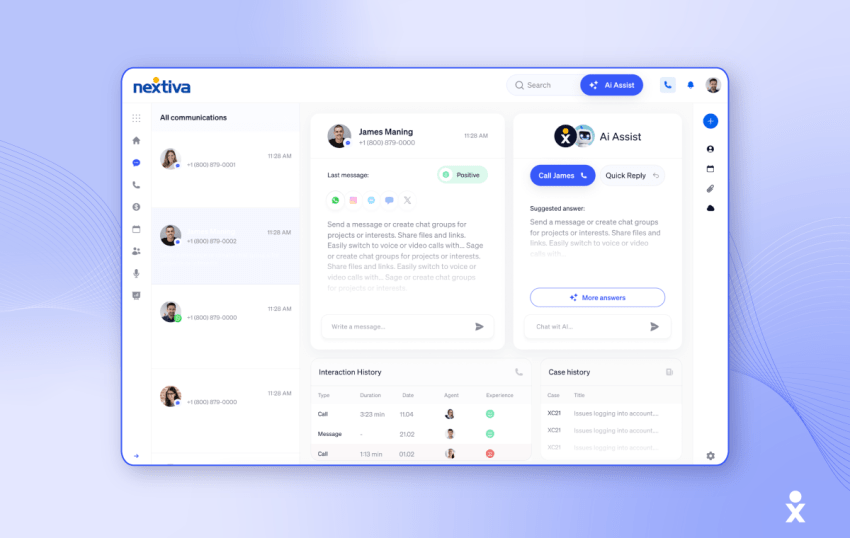
Nextiva is an all-in-one cloud communications platform that combines VoIP phone service, video meetings, team chat, CRM, and business text messaging software in a single, unified workspace. You can look at Nextiva’s messaging capabilities in two ways:
- Business SMS: Send and receive texts using your business VoIP number without signing up for a third-party SMS messaging provider.
- Message Pro: This is designed for teams and brings SMS into your shared workspace. Incoming messages go to the entire team, so any member can continue the conversation.
Nextiva gives you customer personality insights to guide tone, shared messaging templates for consistency, and a mini-CRM view with past message history for full context.
Nextiva comes with 20+ native integrations, and you can use connectors like Zapier or Nextiva’s APIs to build custom ones. It’s also fully compliant with industry standards from the Cellular Telecommunications Industry Association (CTIA), making it easy for businesses to follow SMS regulations.
 Pros
Pros
Allows you to send texts directly from your VoIP business number
Combines SMS to customers and DMs to teammates on one platform to avoid tab switching
Analyzes a customer’s historical data and personality to give reply suggestions
 Cons
Cons
Doesn’t support SMS short codes
Doesn’t allow international SMS
Key features
- Unified messaging: Manage SMS, voice, video, email, and team chat in one platform and with full context of previous customer conversations.
- Team-based SMS routing: Send incoming texts to a shared team inbox and route them to an agent’s queue based on their experience or workload.
- Business automation builder: Trigger actions like sending automated messages based on customer events or time-based rules.
- After-hours auto-replies: Set automated responses outside of business hours to let customers know your business is closed, when you’ll reopen, and when they can expect a reply.
- Automatic SMS notifications: Send automated text messages like appointment reminders, status updates, and surveys.
- Consent management: Use Nextiva’s built-in tools to capture consent, manage opt-outs, and enforce proper messaging practices.
- AI-powered redaction: Automatically hide personal information in call transcripts, screen recordings, and messages.
- Desktop and mobile app: Send and receive texts from your business number, and get real-time notifications on your phone, desktop, or browser with Nextiva’s apps.
Apart from these, you also benefit from Nextiva’s larger feature set, like trend reports, customer journey workflows, sentiment analysis, and AI-powered ticket routing.
Pricing
As a complete CX solution, Nextiva has a tiered pricing model that includes support for SMS service, VoIP, and digital channels, with all plans supporting Nextiva SMS. The pricing plans are divided into two main categories:
Small business
- Core: $15 per agent per month, billed monthly
- Engage: $25 per agent per month, billed monthly
- Power Suite CX: $75 per agent per month, billed monthly
Enterprise
- Essential: $75 per agent per month, billed monthly
- Professional: Custom pricing
- Premium: Custom pricing
SMBs with 1–100 employees also get a steep discount when signing a paid 12-month (or longer) agreement as a new customer.
Ratings and reviews
- G2: 4.5/5
- Trustpilot: 4.8/5
Many reviewers mention reliability, ease of use, and standout customer support for the favorable review.
Some also appreciate how it brings VoIP, SMS, email, and other channels into one platform. This aligns with the sentiment in the 2025 Nextiva CX Trends Report, where 81% of respondents said they wanted to consolidate their CX tools into one platform.

2. EZ Texting
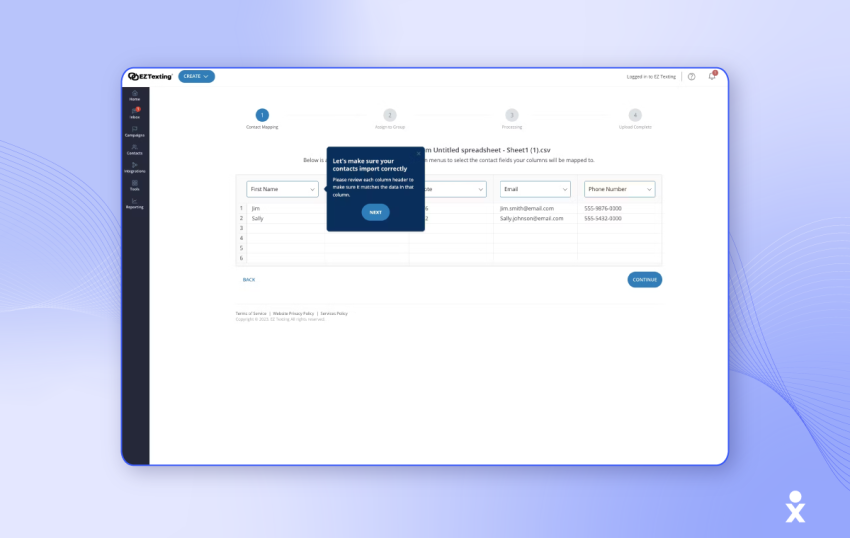
As the name suggests, EZ Texting is designed for non-tech businesses that want to explore SMS marketing services without being intimidated by complex features and workflows. For example, you get a ready-to-use local number so you can start immediately and don’t have to go through the 10DLC process.
The UI is mostly intuitive, and you get detailed getting-started docs and even onboarding support on the higher plans. While you can do most things, including SMS blasts, two-way texting, and drip campaigns, the features tend to be less advanced.
It comes with out-of-the-box integrations for Mailchimp, HubSpot, Squarespace, Shutterstock, and Constant Contact. You can use Zapier to connect to other tools.
 Pros
Pros
Comes with a built-in image library and editor for MMS
Each account includes a local textable number so you can start immediately
Allows you to forward calls to the local number to your VoIP
 Cons
Cons
Provides only an iOS app; Android users will have to use the mobile browser
The parent-child setup lacks a unified view, and credits sent to child accounts cannot be reversed
Features like short code are only available on the Enterprise plan
Key features
- Automations: Send automated reminders and gather customer feedback via SMS polls.
- Advanced triggers: Automate sequences and trigger SMSes based on keywords or events.
- AI-assisted messaging: Use AI to generate message drafts quickly, making SMS campaign creation easier.
- Contact segmentation: Organize your contacts into groups for targeted messaging.
Pricing
EZ Texting offers four pricing plans:
- Launch: $25 per month, billed monthly
- Boost: $75 per month, billed monthly
- Scale: $125 per month, billed monthly
- Enterprise: $3,000 per month, billed monthly
It also provides a 14-day free trial (you can only text your phone number) and a 20% discount on annual subscriptions.
Ratings and reviews
- G2: 4.5/5
- Trustpilot: 3.5/5
Much praise comes for EZ Texting’s user-friendly interface. Some reviews also mention that its simplicity can be limiting, especially when it comes to advanced features, like text message automation.
3. Twilio
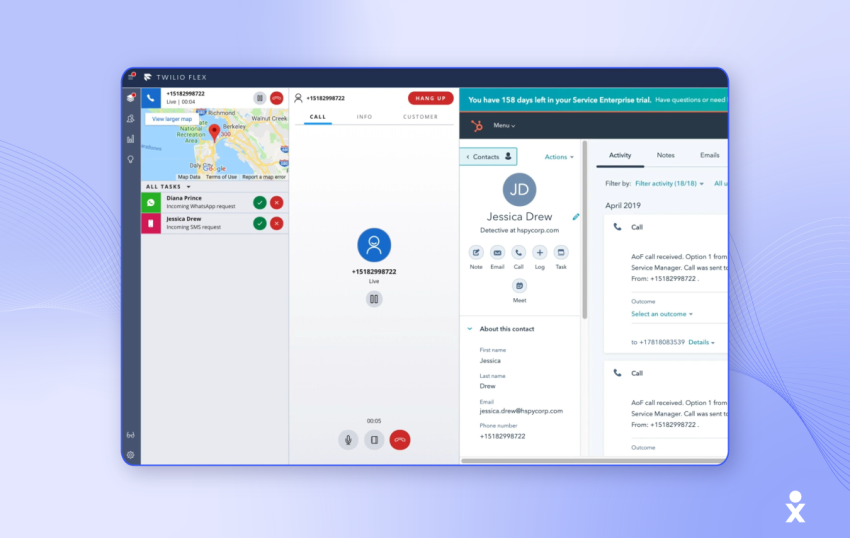
Twilio’s SMS marketing solutions aren’t plug-and-play. You use its programmable APIs to create your own Communications Platform as a Service (CPaaS) setup — they provide the backend infrastructure, and you build the logic and user interface. While Twilio has introduced no-code tools like Twilio Studio and Flex, you’ll still need some tech familiarity to use them.
This makes it best for teams with developer resources or businesses with complex contact center workflows.
 Pros
Pros
Reliable at scale, especially for handling high-volume enterprise communications
Local sender IDs and compliance tools allow you to reach customers in 180+ countries
Provides code snippets, SDKs, and more to help you get started quickly
 Cons
Cons
Implementation takes much longer than other tools on this list
You’re responsible for building the frontend and maintaining your app, which can be risky
Costs can add up, especially if you’re using its no-code or automation tools
Key features
- Omnichannel messaging: Set up unified two-way messaging across the SMS platform, WhatsApp, live chat, and more.
- Custom logic: Build custom messaging logic using Twilio’s programmable messaging API.
- Delivery tracking: Track the status of outbound messages with callback endpoints and URLs.
Pricing
Twilio has a usage-based pricing model, where costs vary based on the type of message (SMS vs. MMS, inbound vs. outbound) and the phone number used (short code, long code, or toll-free). It starts at $0.0083 per inbound SMS on a local number and can go up to $0.022 for an outbound MMS via a short code.
Two things to consider:
- Texts are billed per segment, not per message, and those longer than 160 characters are split into segments.
- You’ll be charged $0.001 for messages that end in a “Failed” status.
Twilio’s no-code tools, like Studio or Flex, have their own pricing, separate from text message costs.
Ratings and reviews
- G2: 4.2/5
- Trustpilot: 1.1/5
Feedback on G2 is mixed. Users like how flexible it is, but many say it’s not easy to set up and takes time to get everything working, as support is slow. Trustpilot scores are significantly lower, with many reviewers saying they’re frustrated with Twilio’s customer support.
4. SimpleTexting
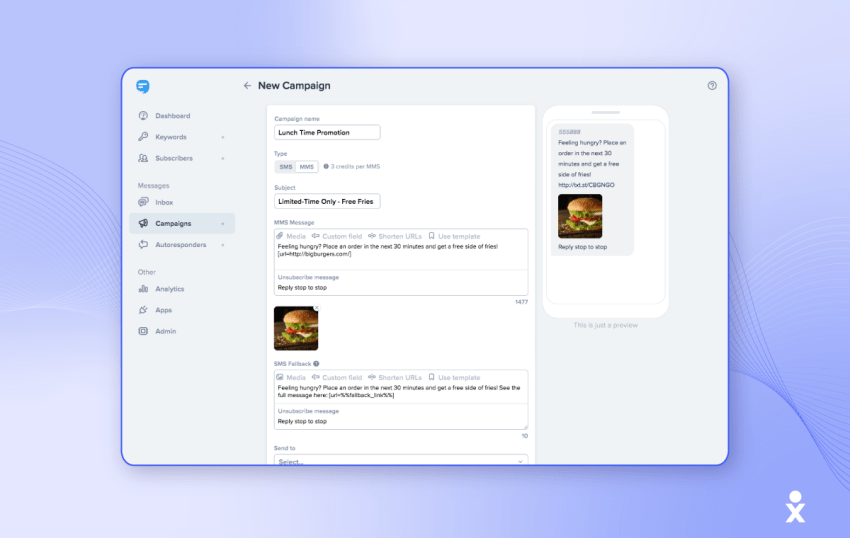
SimpleTexting is an SMS marketing software that’s built for non-tech users, especially teams at mid-sized enterprises. You get quite a few advanced features, and they also build custom integrations on request and for an additional fee.
While SimpleTexting does support agencies and franchises, the costs can add up quickly. You’ll pay $20 per month for each additional user and $10 per month for every extra phone number.
There are also no native integrations. You’ll have to build your own with Zapier.
 Pros
Pros
Detects and removes dead numbers automatically
You can use tags to filter messages to different campaigns
You can send files via SMS — it’ll be shared as a hyperlink
 Cons
Cons
Scheduled text messages go out in batches, which can lead to delays
Supports only plain text
Pricing can be complicated as it involves credits and add-ons
Key features
- Timed auto-responders: Set auto-responders with delivery windows so your contacts aren’t disturbed at the wrong time, like on weekends.
- Segmentation: Group subscribers based on behavior or demographics for targeted campaigns.
- Capture forms: Build forms to collect subscribers and get opt-ins from your site or social media.
- SMS polling: Collect feedback or opinions using SMS polls and text-to-vote campaigns.
Pricing
SimpleTexting uses a credit-based pricing model with all features available to everyone. It starts at $39 per month for 500 credits and a local number, which typically covers 500 SMS messages. Outgoing MMS messages cost three credits each, and incoming MMS costs one credit. Any unused credits roll over to the next month.
You can also add team members for $20 per month per user and extra numbers for $10 per month each. Nonprofits, churches, and other tax-exempt groups get 15% off any monthly plan.
Ratings and reviews
- G2: 4.7/5
- Trustpilot: 4.3/5
Most reviewers say it’s easy to set up and use, though some mention that the app can be a bit unstable at times.
5. Textedly
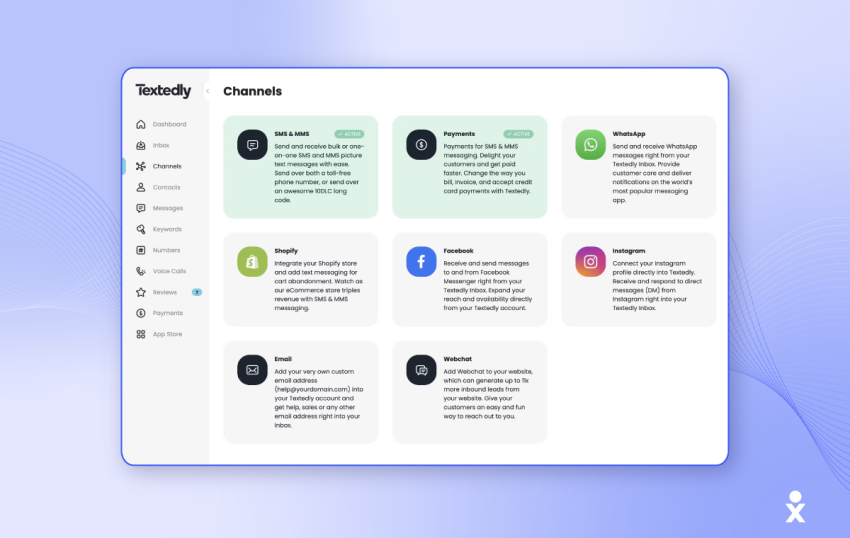
Textedly is best for retailers and e-commerce businesses that use SMS marketing services as one of the primary channels because you get high-utility features like Text-to-Pay and SMS review requests, along with core capabilities like mass text messaging, omnichannel inbox, and automation.
However, it focuses more on action than analysis, offering only basic metrics without advanced visualizations. There are also no native integrations.
Textedly only supports subscriber-based triggers and actions. There are no message or campaign-based triggers. This means you can’t perform actions like posting incoming text messages on Slack.
 Pros
Pros
Supports rich text formatting for SMS
Gives you a 300-character limit for SMS, making it easier to add Unicode symbols that take up more space
Pricing plans come with a toll-free and 10DLC number
 Cons
Cons
You can’t move phone or web conversations to text
Not HIPAA compliant by default. You'll need to sign a Business Associate Agreement (BAA)
You have to pay $10 for a new keyword, which can make campaigns like text-to-win expensive
Key features
- Payment links: Send customers a secure link that they can click to make payments.
- Lead capture forms: Use webforms to build your contact list and get opt-ins.
- AI assistance: Use the AI Agent Assist features to draft messages and tweak replies.
- Review request links: Text customers a review link that they can click to leave a Google Business review.
- Team inbox: Use the shared inbox to route SMS messages to team members and conduct internal discussions via sticky notes.
Pricing
Textedly offers 11 paid pricing plans, starting $35 per month for 600 text messages and one keyword, up to $4,499 per month for 240,000 text messages and 50 keywords. Annual plans come with a 20% discount.
You can purchase extra texts and keywords as add-ons: $30 for an additional 500 texts and $10 per additional keyword.
Ratings and reviews
- G2: 4.6/5
- Trustpilot: 3.8/5
Textedly is well-rated for features like bulk SMS and two-way messaging, while tools like reporting, team management, and text-to-landline see lower numbers. However, some users mention disappointment with the customer service, stating unfulfilled promises and difficulties canceling their subscriptions.
6. Podium
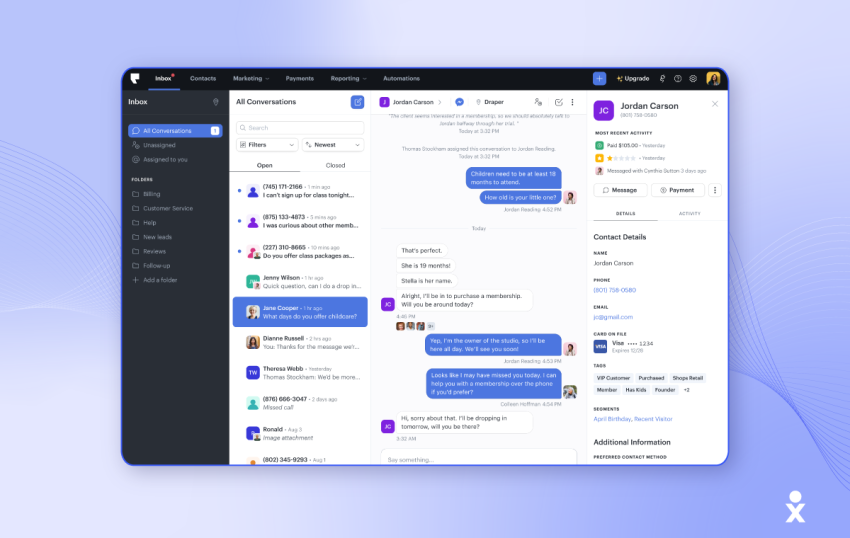
Podium is an AI-powered customer communications platform that supports phone, SMS, and social messaging. These channels are tightly integrated with its AI agent, which can reply to messages, qualify leads, and handle FAQs automatically.
You also benefit from its marketing features like funnel-based lead tracking, automated drip campaigns, and contact profiles. Where it falters is in reporting: you get inbox reports and even lead reports, but they’re scattered.
While Podium offers 50+ integrations and Zapier support, most are geared toward invoicing and general CX, not SMS-specific tasks like opt-ins/opt-outs, delivery reports, or message events.
 Pros
Pros
Get alerts when automations fail or decline in performance
Agentic AI can auto-reply to customer SMS messages
You can purchase one-time bulk messaging credits during seasonal demand
 Cons
Cons
While messages go to agents via the round robin method, their workload isn’t considered
No automated QA features; you’ll have to manually review the AI agent’s responses and provide feedback
MMS can get pricey at 3 credits for the U.S., 5 credits for Canada, and 15 credits for Australia
Key features
- Unified CRM: Consolidate leads from texts, calls, forms, and email into one central CRM.
- AI assistance: Provide instant answers, respond to reviews, and summarize phone calls automatically with AI.
- Automations: Set up custom automated workflows triggered by actions like events or status changes.
- Link shortening: Use Podium’s approved domain, Podium.com, for link shortening so carriers don’t block your message.
Pricing
Podium has three plans, but pricing is quote-based, so you’ll need to contact their sales team for the exact rate. Also, the phone systems and AI agents are add-ons and not included in the base plans.
Ratings and reviews
- G2: 4.6/5
- Trustpilot: 1.6/5
On G2, Podium scores highly for its core SMS features, while its AI agent, integrated with SMS, lags slightly behind at around 65%–70%. Most reviewers on Trustpilot mention disappointment with the AI agent features and the need for better customer service.
7. Textmagic
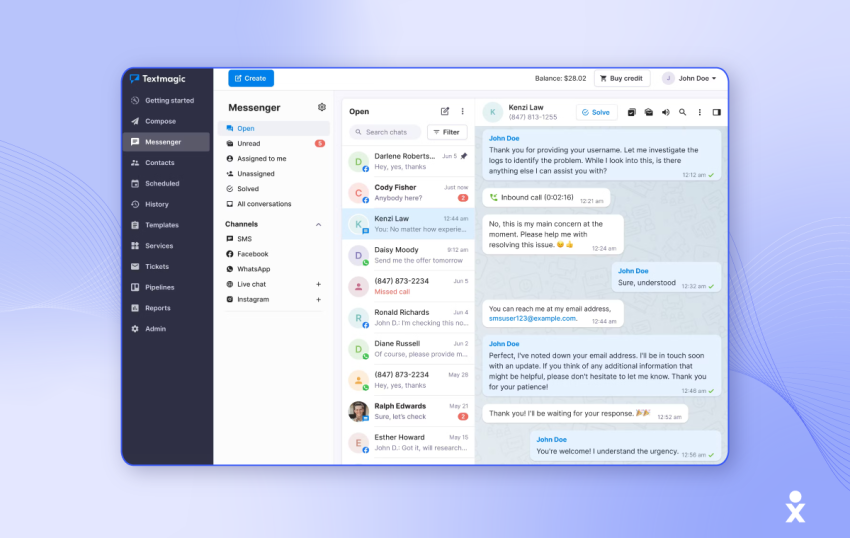
Textmagic is one of the best text messaging systems for small businesses and teams-of-one that prefer managing SMS through email instead of a separate tool. It’s simple with an uncluttered UI and has a variety of features like omnichannel widgets, voice, AI assistance for agents, and task management.
However, its focus on simplicity and broad functionality means it offers little depth, so some advanced features like automation and reporting are pretty basic. You’ll need to build advanced features like callback URLs and Unicode messages using its SMS Gateway API.
Integrations are only supported via Zapier, and while the triggers here are limited, you have plenty of options for actions.
 Pros
Pros
Automatically filters out landline numbers from your contact list, so you only send texts to mobile numbers
Lets you schedule SMS messages from inside email provider apps like Gmail and Outlook
Customers in the U.K. and Australia get a free sender ID
 Cons
Cons
Unlike some other tools, it doesn’t let you connect a landline number to the platform for sending SMS
Doesn’t support cross-border texting
There can only be one active SMS survey on a number
Key features
- Email-to-SMS: Have one-on-one conversations or send group texts from your email by sending it to {phonenumber}@textmagic.com and receive their replies in your inbox as well.
- Templates: Personalize templated messages with mail merge and dynamic fields for quick responses and recurring messages.
- Number validation tools: Check number validity and carrier info through bulk imports or API integration.
- Task management: Create and categorize tasks to prioritize conversations and track customer issues.
Pricing
Textmagic uses a credit-based pricing model. Outbound SMS costs $0.049 per message, MMS costs $0.08 per message, and email marketing campaigns cost $0.006 per email.
Phone numbers (local or toll-free) are $10 per month, and the 10DLC registration is also $10 per month, though both are free for the first month.
Services like carrier/email lookup cost $0.04 per query, and voice calling starts at $0.041 per minute for outbound and $0.023 per minute for inbound. Textmagic doesn’t charge separately for social messaging, the email help desk, or task management.
Ratings and reviews
- G2: 4.3/5
- Trustpilot: 4.4/5
Users highlight Textmagic’s easy setup and helpful automation tools, while some point out usability quirks in the inbox and reports. Some also praise its email-to-SMS features.

Business Text Messaging Campaigns and SMS Marketing Use Cases
Traditionally, e-commerce businesses have used SMS marketing platforms for text blast services to inform readers about discounts or sales.
But business text messaging campaigns are not limited to e-commerce. Companies in all industries, from tech to healthcare, can benefit from using automated texting software to communicate with customers and employees.
Uses for business text messaging
Beyond digital marketing campaigns, some practical use cases for using a business texting services include:
- Meeting confirmations and contact information: Send a text message to confirm a meeting time, location, and any necessary contact information.
- Personal thank you messages: Send a personal thank you message to a customer after they purchase or complete a service. These can be set up with autoresponders to ensure each customer receives the same experience.
- Team/group texting: Use group texting to communicate with your team members quickly and efficiently.
- Product/order updates: Send follow-ups and updates on a customer’s order or product delivery status. Your customers will appreciate this — in fact, 56% of customers say they don’t mind sharing their information for better service.
- Sending gift cards: Companies can use gift cards to thank customers or offer them as promotional offers. This is quite relevant at the moment, as 79% of consumers surveyed by McKinsey mention they’re reducing spending and are on the lookout for discounts.
- Two-factor authentication: Use text messaging as part of a two-factor authentication process to enhance security.
- Customer job-site photos: Send photos of a job site to customers to keep them informed about progress. This can be particularly effective, as 79% of consumers prefer personalized experiences over personalized messages.
- Appointment reminders: Send appointment reminders to customers to reduce no-shows. According to SolutionReach, this can save practices up to $5,000 per year per staff member who would otherwise spend time calling patients manually.
- Customer event and community invites: Invite customers to events or community activities via text message. If you’re using A2P messaging for this, make sure your campaigns are registered with The Campaign Registry to stay compliant and avoid message filtering.
- Customer satisfaction surveys: Send chat-based SMS surveys to collect feedback and measure customer satisfaction (CSAT). This helps maintain a personal touch, ensures immediate responses to inquiries, and improves overall customer outcomes.
These are just a few examples of how businesses can use text messaging effectively. The key is to think creatively and find ways to use text messaging that will benefit your business and your customers.
What To Look for in a Business SMS Provider
When choosing a business SMS service, it’s important to consider the features and functions that align with business requirements. Below are some essential attributes to watch for:
- Virtual phone numbers: A virtual phone number enables you to send and receive texts via a local or toll-free line. They are ideal for businesses keen on sustaining a local image or offering clients a toll-free way to reach out.
- Team messaging: Team-based collaboration facilitates several users to send and receive SMS from a collective inbox, which is ideal for firms looking to encourage team members to support customers and prospects via SMS or MMS.
- Toll-free texting support: Texting customers from a toll-free business phone number lets customers intuitively call your sales or support line, who prefer discussing matters verbally.
- Generous text message volumes: A valuable service will grant a generous quota of messages, for instance, 1,000 texts for each user every month, catering to businesses with extensive texting needs.
- Desktop functionality: This feature facilitates exchanging texts from your PC, which is ideal for businesses whose teams prefer desktop-based communication.
- Mobile functionality: A smartphone app is a must if you want to exchange business text messages through mobile or tablet devices, befitting businesses aiming for flexibility and mobility in communication.
In addition to these critical features, excellent customer support, pricing, and positive customer reviews are vital to consider before settling on a business text messaging app for your company.
Before implementing text messaging into your business protocols, you must ensure you do so in a way that complies with industry best practices and legal requirements.
Business SMS Compliance Checklist
Business text messaging is highly effective. It’s also highly regulated, and if you fail to comply with global SMS marketing laws, you can be fined thousands of dollars. You also lose customer trust, and chances are high that you’ll be blocklisted by carriers.
For instance, Telstra was fined $396,714 for making people share personal info just to unsubscribe from texts. In the U.S., each noncompliant text can trigger a fine of $500–$1,500 under the Telephone Consumer Protection Act (TCPA) — and that’s per message, not per campaign.
Phone companies and governments have collectively established benchmarks for unsolicited phone calls and text messaging. In North America, the CTIA and the FCC’s TCPA regulate message content, frequency, and dispatch.
Here’s a general checklist to stay compliant with SMS rules from the above organizations:
- Get explicit opt-in: Get consent for SMS communications specifically, and keep a record of the opt-in data. You can also consider double opt-in or separate opt-ins for different campaigns.
- Provide clear opt-out instructions: Every text sent out should have straightforward directions for recipients who want to discontinue the service. For example, “To stop receiving messages, reply with STOP.”
- Honor do-not-contact (DNC) lists: Update your DNC list in real time so scheduled messages don’t go out to people who’ve unsubscribed or opted out.
- Avoid sending messages at restricted times: Under the TCPA, messages must only be sent between 8 a.m. and 9 p.m. in the recipient’s local time zone, unless you’ve received explicit consent to do otherwise.
- Follow data privacy laws: Following data protection regulations is non-negotiable when handling customer details. Check your state or local authority for more information. For example, you’ll need to be GDPR-compliant if you’re handling data in the EU and HIPAA-compliant for handling healthcare customer experience.
By following these legal and industry requirements, you can ensure you’re using text messaging responsibly.
Nextiva’s Business Texting Solution
Adopting a texting app for business is essential for customer engagement and streamlined communication today. The right tool enhances customer support and drives sales. Nextiva is a proven leader in unified customer experience management, and business text messaging is no exception.
Among the many options available, Nextiva stands out as a top solution. It offers unparalleled reliability and enterprise-grade communication features, such as SMS, voice, video, social media, and live chat. As a cloud communications leader, Nextiva can help businesses enhance their messaging strategy, deliver a superior customer experience, and boost sales.
Customers love businesses that text.
Talk with prospects and customers the way they prefer across every channel, including SMS/MMS.
Business Text Messaging FAQs
Yes, you can add SMS text messaging to your VoIP phones. The best business text messaging services offer integration with VoIP phone service, allowing you to send and receive text messages using your existing phone number. This integration enables you to streamline business communications by using a single platform for both voice and text, enhancing customer interactions and improving operational efficiency.
The Federal Trade Commission has strict guidelines and penalties for businesses that spam customers with unwanted text messages. Messages and numbers marked as “spammy” also often get blocked or filtered, so before sending a text message, we recommend asking yourself, “Would I mind receiving this?”
10DLC, or 10-Digit Long Code, is a messaging system designed for businesses to send SMS messages using a local phone number. This system allows companies to communicate with customers more effectively by providing a recognizable and trustworthy number, enhancing customer engagement, and message deliverability.
Unlike short codes, typically used for mass messaging, 10DLC offers a cost-effective solution for businesses that need to send personalized messages. It supports higher message volumes than traditional long codes and complies with carrier regulations, ensuring that messages are delivered reliably and securely.
Yes, there are several free text messaging apps for businesses, such as Google Voice, TextNow, and TextFree.
However, these services have limitations on the number of messages you can send, deliverability issues, and are restrictive in the features they offer. Most importantly, these free text numbers are often reassigned and are blocked from text message verification services.
Free texting services often come with limitations. Many providers offer free trial periods or basic plans that include a limited number of monthly messages. These options can benefit startups exploring SMS marketing without a financial commitment. However, free plans may lack advanced features like automation, integrations, and analytics, which are crucial for scaling communication efforts.
The terms text messaging and SMS messaging are often used interchangeably, but they are different:
SMS, which stands for “Short Message Service,” is the most basic form of text messaging, allowing users to send plain text messages.
Text messaging is a broader category that includes SMS and MMS messages, as well as internet-based messaging with enhanced features.


















 Business Communication
Business Communication 











